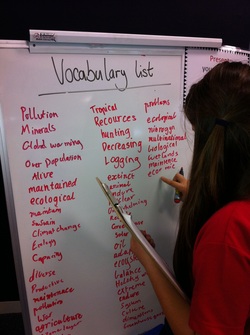vocabulary development

One of the many great outcomes of S.O.L.E. is the amount of new vocabulary that is obtained by students as they research the topic.
The vocabulary that is recorded is relevant and is contextual. Students are learning new vocabulary and using it throughout the session and in subsequent lessons.
Marzano talks about the importance of vocabulary and how its importance cannot be overstated. Vocabulary provides essential background knowledge and is linked to academic achievement.
Effective teachers ensure students are immersed in vocabulary and that they engage with the vocabulary in a variety of ways.
In S.O.L.E. sessions all new vocabulary is introduced to the students in context - it’s always in a sentence; and to quote Professor John Munro "The sentence is the conveyor of meaning".
Teachers may front load some of the expected vocabulary before students research but they always explore vocabulary with their students to ensure meaning.
The vocabulary that is recorded is relevant and is contextual. Students are learning new vocabulary and using it throughout the session and in subsequent lessons.
Marzano talks about the importance of vocabulary and how its importance cannot be overstated. Vocabulary provides essential background knowledge and is linked to academic achievement.
Effective teachers ensure students are immersed in vocabulary and that they engage with the vocabulary in a variety of ways.
In S.O.L.E. sessions all new vocabulary is introduced to the students in context - it’s always in a sentence; and to quote Professor John Munro "The sentence is the conveyor of meaning".
Teachers may front load some of the expected vocabulary before students research but they always explore vocabulary with their students to ensure meaning.
